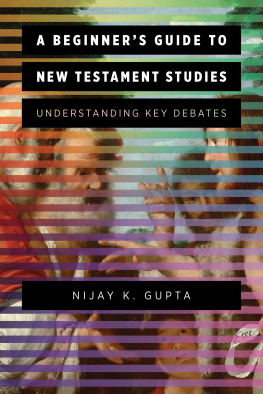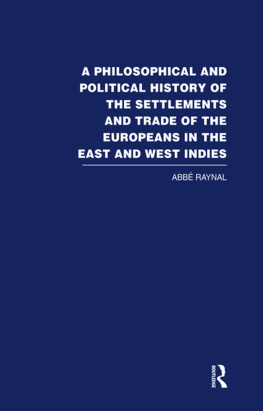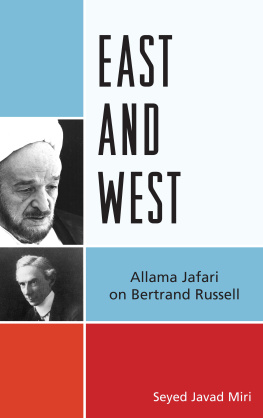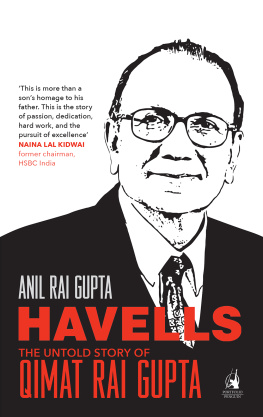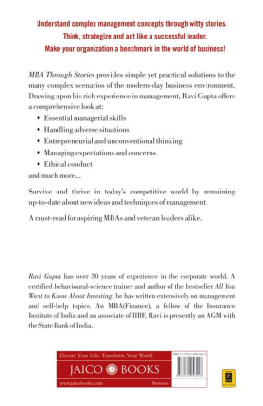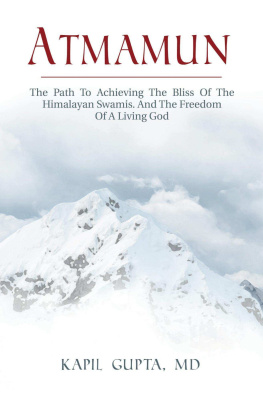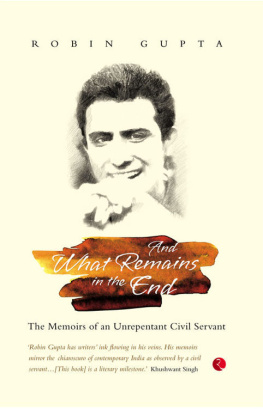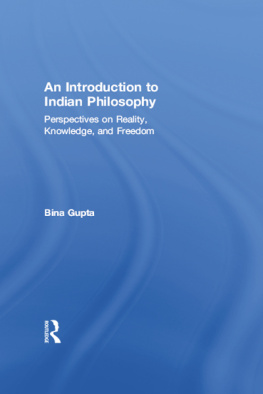Gupta Bina - Philosophical questions: East and West
Here you can read online Gupta Bina - Philosophical questions: East and West full text of the book (entire story) in english for free. Download pdf and epub, get meaning, cover and reviews about this ebook. City: Lanham;Md, year: 2000, publisher: Rowman & Littlefield Publishers, genre: Religion. Description of the work, (preface) as well as reviews are available. Best literature library LitArk.com created for fans of good reading and offers a wide selection of genres:
Romance novel
Science fiction
Adventure
Detective
Science
History
Home and family
Prose
Art
Politics
Computer
Non-fiction
Religion
Business
Children
Humor
Choose a favorite category and find really read worthwhile books. Enjoy immersion in the world of imagination, feel the emotions of the characters or learn something new for yourself, make an fascinating discovery.

- Book:Philosophical questions: East and West
- Author:
- Publisher:Rowman & Littlefield Publishers
- Genre:
- Year:2000
- City:Lanham;Md
- Rating:3 / 5
- Favourites:Add to favourites
- Your mark:
- 60
- 1
- 2
- 3
- 4
- 5
Philosophical questions: East and West: summary, description and annotation
We offer to read an annotation, description, summary or preface (depends on what the author of the book "Philosophical questions: East and West" wrote himself). If you haven't found the necessary information about the book — write in the comments, we will try to find it.
Philosophical questions: East and West — read online for free the complete book (whole text) full work
Below is the text of the book, divided by pages. System saving the place of the last page read, allows you to conveniently read the book "Philosophical questions: East and West" online for free, without having to search again every time where you left off. Put a bookmark, and you can go to the page where you finished reading at any time.
Font size:
Interval:
Bookmark:
Philosophy and the Global Context
General Editor: Michael Krausz, Bryn Mawr College
This new series addresses a range of emerging global concerns. It situates philosophical efforts in their global and cultural contexts, and it offers works from thinkers whose cultures are challenged by globalizing movements. Comparative and intercultural studies address such social and political issues as the environment, poverty, consumerism, civil society, tolerance, colonialism, global ethics, and community in cyberspace. They also address related methodological issues of translation and cross-cultural understanding.
Editorial Advisory Board
Ted Benton, University of Essex
David Crocker, University of Maryland
Fred Dallmayr, University of Notre Dame
Elliot Deutsch, University of Hawaii
Nancy Fraser, New School for Social Research
Jay Garfield, University of Tasmania
David Theo Goldberg, Arizona State University
Rom Harr, Georgetown University
Bernard Harrison, University of Utah
Ram Mall, University of Cologne
Joseph Margolis, Temple University
Jitendra Mohanty, Temple University
Ashis Nandy, Centre for the Study of Developing Societies, Delhi, India
Martha Nussbaum, University of Chicago
Amlie Oskenberg Rorty, Brandeis University
Mark Sagoff, University of Maryland
Margarita Valds, University of Mexico
Titles in the Series
Intellectual Property: Moral, Legal, and International Dilemmas (1997) by Adam D. Moore
Ethics of Consumption: The Good Life, Justice, and Global Stewardship (1998) edited by David A. Crocker and Toby Linden
Alternative Visions: Paths in the Global Village (1998) by Fred Dallmayr
East and West
Edited by
Bina Gupta
and
J. N. Mohanty

ROWMAN & LITTLEFIELD PUBLISHERS, INC.
Published in the United States of America
by Rowman & Littlefield Publishers, Inc.
A wholly owned subsidiary of the Rowman & Littlefield Publishing Group, Inc.
4501 Forbes Boulevard, Suite 200, Lanham, Maryland 20706
www.rowmanlittlefield.com
PO Box 317
Oxford
OX2 9RU, UK
Copyright 2000 by Rowman & Littlefield Publishers, Inc.
All rights reserved. No part of this publication may be reproduced, stored in a retrieval system, or transmitted in any form or by any means, electronic, mechanical, photocopying, recording, or otherwise, without the prior permission of the publisher.
British Library Cataloguing in Publication Information Available
Library of Congress Cataloging-in-Publication Data
Philosophical questions : East and West / edited by Bina Gupta and J.N. Mohanty.
p. cm.(Philosophy and the global context)
Includes bibliographical references and index.
ISBN: 978-0-8476-9285-9
1. Philosophy, Comparative. 2. East and West. I. Gupta, Bina, 1947 II. Mohanty, Jitendranath, 1928 III. Series.
| B799.P46 1996 | |
| 100dc21 | 99-042372 |
Printed in the United States of America
 The paper used in this publication meets the minimum requirements of American National Standard for Information SciencesPermanence of Paper for Printed Library Materials, ANSI/NISO 239.481992.
The paper used in this publication meets the minimum requirements of American National Standard for Information SciencesPermanence of Paper for Printed Library Materials, ANSI/NISO 239.481992.
This is a new venture on our part. The idea of putting together such a volume arose out of our experience of teaching courses on Philosophy: East and West. Eastern philosophy represents one of the most ancient intellectual traditions in human culture, yet it is generally ignored by Western philosophers. The neglect may stem from a prevalent bias that philosophy as a systematic inquiry, properly understood, is exclusively a Western phenomenon and hence absent in non-Western traditions. The editors of this anthology, trained in both Western and Eastern philosophy, clearly demonstrate that philosophy is more than a history of Greek and European thought.
In this work, we present the readers with the questions and challenges that philosophers confront today irrespective of their tradition. A dialogue across traditions is both necessary and desirable; perhaps it is inevitable. In order for it to be fruitful, it must begin with a sensitivity to both differences and commonalities, neither ignoring the differences nor attempting to reduce the one to the other. When similarities are uncovered, they are potentially revealing, while differences speak for themselves. And whatever unique insights are offered within one philosophical tradition can and should be grist for other philosophic mills.
Keeping the above in mind, the texts have been selected from different streams within the Eastern and the Western traditions, though the materials selected have been grouped under traditional philosophical categories: metaphysics, epistemology, ethics, and religion. We have also included a section on philosophical anthropology, a central concern of philosophy of the East and the West alike. Selections in each section are preceded by an introduction and followed by study questions and suggestions for further reading.
We welcome suggestions, comments, questions, and responses from the instructors who use this volume for their classes.
Above all, we hope this volume will contribute toward breaking the barriers between the East and the West, which specialists have set up over centuries.
A Framework
for Comparative Philosophy
In the history of Western thought, there is a strong and influential tendency to look upon philosophy as a Western cultural product. The word philosophy is Greek in origin. But is the discipline called philosophy also Western? Even such an eminent and perceptive philosopher as Edmund Husserl held that the expression Western philosophy is tautologous and the idea of non-Western philosophy a contradiction in terms. The present anthology could serve as a refutation of that narrow conception of philosophy. Happily, today most serious thinkers have come to accept that there are genuine non-Western systems of thought which deserve to be called philosophy.
If philosophy is a thinking consideration of things, then one cannot a priori restrict such thinking only to the West. If philosophy consists in attempts to answer ultimate questions about the nature of reality, the nature and methods of knowledge, the standards of moral judgment, and the deliverance of religious consciousness, then one unmistakably finds such attempts in Indian, Chinese, and Islamic thought. Metaphysics, epistemology, and logic underwent significantly sophisticated developments in India; metaphysics and ethics developed in China; all of these subdisciplines were cultivated in the Islamic world.
Now that science, technology (especially information technology), trade, and commerce promise to transform the world into a global village, it would be anachronistic if students of philosophy read only about Western philosophy, thereby acquiring the prejudice that that is all there is to philosophy. How sad it is that students of philosophy learn about Plato and Aristotle, Kant and Hegel and Nietzsche, and do not learn anything about Gautama and Confucius, or about akara and Ngrjuna, or about Avicenna and Al Ghazli.
The editors of the present anthology were inspired by the belief that there are at least three birthplaces of philosophy: India, China, and Greece.
Font size:
Interval:
Bookmark:
Similar books «Philosophical questions: East and West»
Look at similar books to Philosophical questions: East and West. We have selected literature similar in name and meaning in the hope of providing readers with more options to find new, interesting, not yet read works.
Discussion, reviews of the book Philosophical questions: East and West and just readers' own opinions. Leave your comments, write what you think about the work, its meaning or the main characters. Specify what exactly you liked and what you didn't like, and why you think so.


